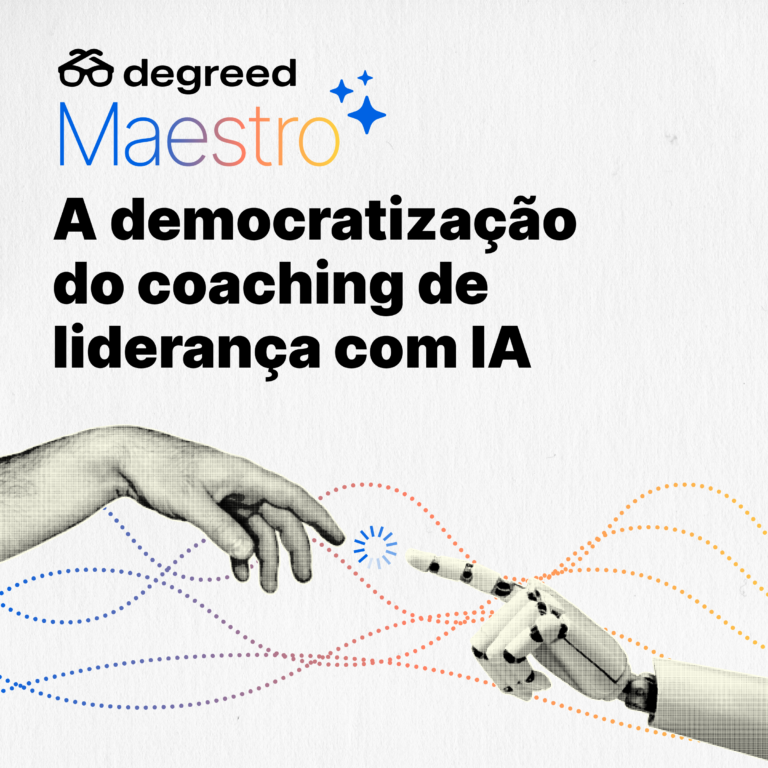
Degreed Maestro: a democratização do coaching de liderança com IA
Este é o terceiro post de uma série sobre coaching personalizado com IA com o auxílio do Degreed Maestro. Não deixe de conferir o primeiro e o segundo.
Quando a liderança é fraca, não é apenas o moral dos colaboradores que sofre. Os resultados da empresa não se sustentam.
Em empresas listadas na S&P 1500, transições malfeitas entre CEOs fazem com que o prejuízo seja de quase US$ 1 trilhão em valor de mercado a cada ano. E a rotatividade dos colaboradores decorrente de lideranças fracas tem um custo de US$ 630 bilhões por ano para empresas americanas.
Liderança não é algo fácil de desenvolver, e é particularmente difícil para novos líderes. Eles precisam de apoio e de prática para lidar com novos desafios.
Em algumas situações, as empresas contratam coaches para ajudar novos líderes ter sucesso na migração de um cargo de liderado. Contudo, o coaching individual é caro e difícil de escalar, deixando de ser uma opção para a maioria dos colaboradores.
A boa notícia é que os avanços tecnológicos ajudam a democratizar o coaching de liderança. Com as ferramentas e os investimentos certos, as organizações podem apoiar líderes de todos os níveis com bom custo-benefício — e a IA está facilitando esse processo de uma forma inédita.

Coaching de liderança com IA
O Degreed Maestro, nossa IA desenvolvida especialmente para fins de aprendizagem, está pronto para ajudar os líderes da sua empresa a aprimorar as habilidades de forma eficiente nas áreas em que eles — e os negócios — mais precisam.
O Degreed Maestro se comunica diretamente com os aprendizes e guarda todo o histórico de conversas, o que permite a ele entender toda a trajetória de habilidade dos seus líderes, identificando, inclusive, qual é a situação atual deles. E o mais importante: ele sabe como orientar os líderes para que eles cheguem aonde precisam chegar.
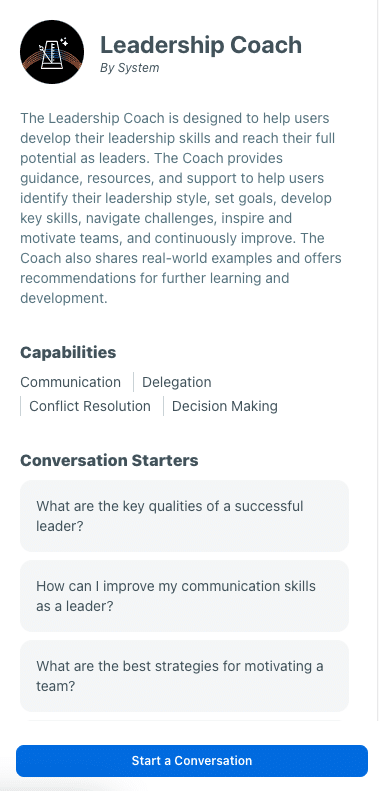
O Maestro leva os líderes a conteúdos altamente direcionados e simula diálogos da vida real para que eles possam praticar suas posturas diante de novos desafios. Isso é bastante útil para aprender a lidar com conversas delicadas que os novatos da liderança ainda não tiveram a chance de conduzir.
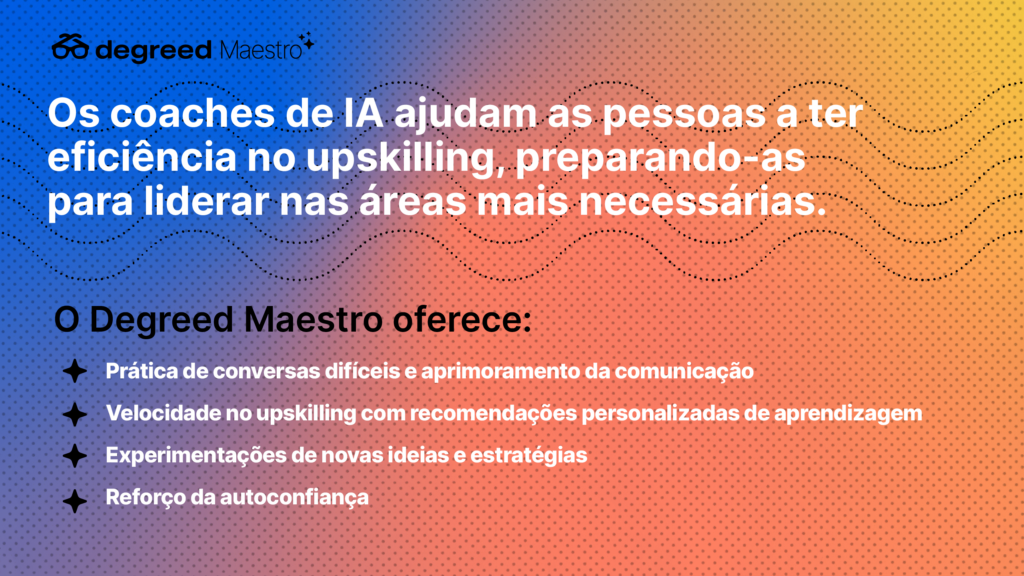
Degreed Maestro em ação: a prática de uma conversa sobre desempenho
Nos posts recentes, acompanhamos Marcos, um colaborador fictício que usou o Degreed Maestro para descobrir seus pontos fortes e áreas que podem melhorar em relação a habilidades, sanar lacunas de habilidades pessoais e praticar o pitch de vendas para um novo produto.
Marcos agora lidera uma equipe de três colaboradores. Infelizmente, um integrante da equipe tem apresentado baixo desempenho com frequência.
Como muitos novos líderes, Marcos fica apreensivo com o papo tão delicado, mas necessário, que precisará ter com essa pessoa. Embora saiba que precisa abordar o problema, Marcos não tem certeza sobre como comunicar os problemas de desempenho de uma forma que demonstre apoio e seja útil.
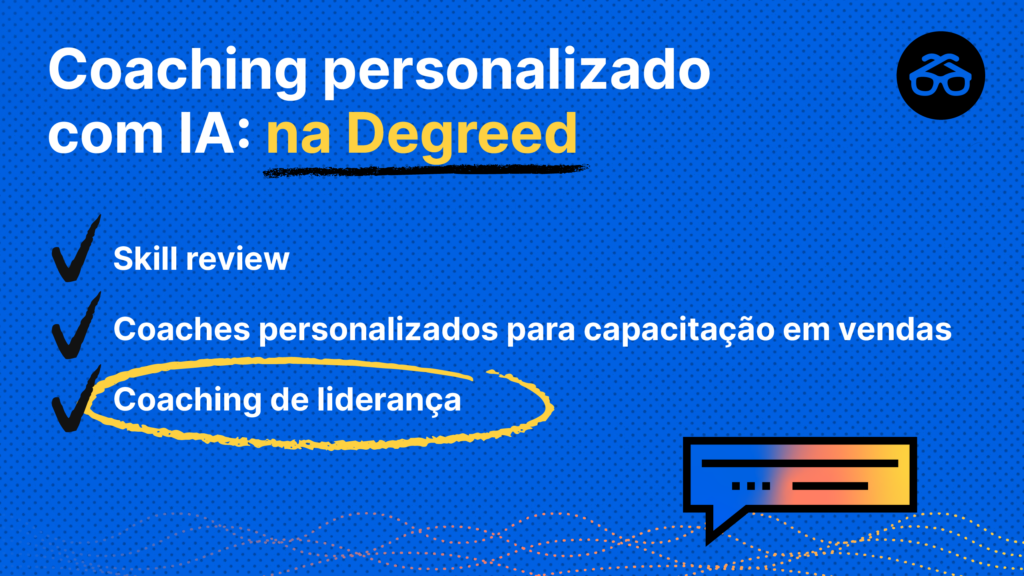
Marcos recorre ao Maestro para buscar orientação. Ele explica a situação e, em resposta, o Maestro pede exemplos específicos de pontos de desempenho em que o colaborador está abaixo das expectativas.
Com base nas informações de Marcos, o Maestro recomenda conteúdos específicos que ensinam técnicas para gerenciar o desempenho de colaboradores. A partir desse conteúdo, Marcos tem mais clareza sobre como falar com o colaborador de uma forma que não pareça um ataque.
Veja esta trilha produzida pelo Maestro:

Embora essa experiência de aprendizagem seja útil, Marcos sente que ele poderia aproveitá-la ainda mais. Como ele deve reagir se o colaborador ficar com raiva? Chorar? Demonstrar indiferença? Marcos quer praticar essas situações antes da reunião.
Com o Maestro fazendo o papel do colaborador, Marcos ensaia seu futuro diálogo, praticando respostas a diversas reações simuladas. Depois, o Maestro apresenta um feedback prático, indicando onde Marcos foi bem e onde ele pode melhorar, além de recomendar materiais específicos que podem reforçar a aprendizagem.

Na conversa real, Marcos acabou se sentindo muito mais confiante e confortável. Ele teve tato para fazer críticas construtivas e articulou bem quais passos o colaborador pode dar para melhorar.
O colaborador apreciou o fato de Marcos compartilhar com ele um plano de ação com expectativas sobre o que precisa melhorar. Ao seguir o plano, o colaborador retoma a normalidade de seu desempenho.

A conquista da fluência em habilidades por meio da prática
Embora a curadoria altamente direcionada tenha ajudado Marcos a fundamentar bem seus conhecimentos, foi a prática que o alavancou. Quando se trata de interações pessoais mais delicadas, como uma conversa sobre desempenho, é fundamental saber agir com calma e confiança. A prática preparou Marcos para pensar com rapidez e responder de forma equilibrada.
O Degreed Maestro ajudou Marco a conquistar a fluência na habilidade, que é capacidade de aplicar habilidades ou especialidades de forma instintiva. Por exemplo, embora um aplicativo de tradução funcione para alguém entender espanhol durante umas férias no México, ele não é suficiente para quem está de mudança para o México; nesse caso, é preciso ser fluente.
A reunião delicada de Marcos é o exemplo perfeito de uma interação que demanda ter fluência em uma habilidade. Ele precisava ter velocidade. Marcos precisava responder de forma rápida e compassiva, sem perder o controle do diálogo.
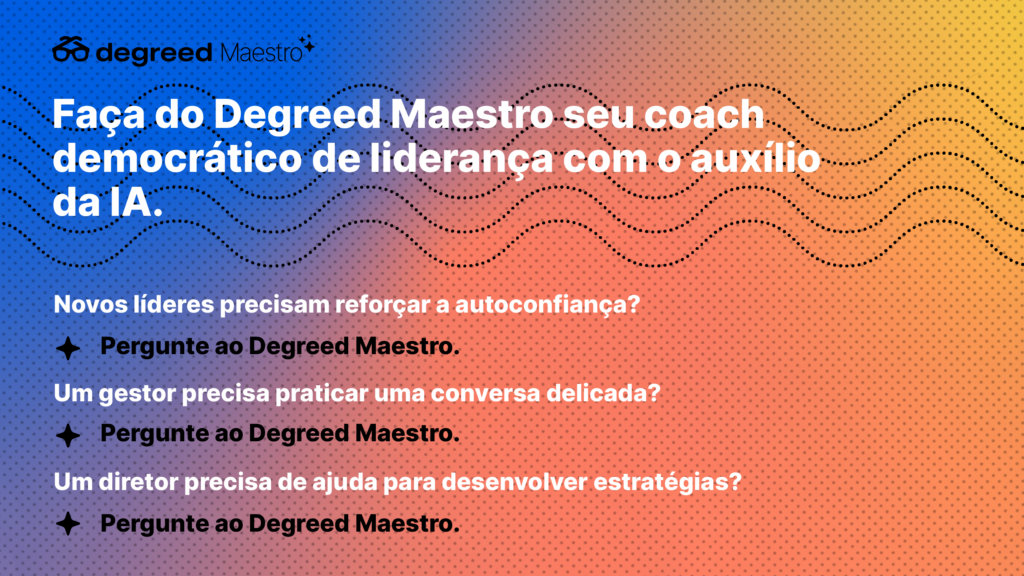
Além da prática
Claro, o coaching de liderança vai muito além do que conversas delicadas.
Bons coaches ajudam os líderes a entender seus pontos fortes e áreas de melhoria, a testar novas ideias, a traçar estratégias, a definir metas e a melhorar a comunicação.
O Degreed Maestro lida com todas essas necessidades e diversas outras, auxiliando os líderes a alcançar o potencial máximo, tomar decisões mais bem embasadas e conduzir os negócios com firmeza.
Fique por dentro
Continue lendo nosso conteúdo. Confira mais posts sobre o Degreed Maestro e os Experimentos da Degreed para ficar por dentro das nossas aplicações e testes mais recentes no campo da IA.
Agende uma demonstração personalizada hoje mesmo.

Vamos manter contato  .
.
Quero assinar a newsletter mensal que oferece insights exclusivos, anúncio de eventos e novidades sobre as soluções da Degreed.
Sua privacidade é importante para nós. Você pode alterar suas preferências de e-mail ou cancelar o recebimento da newsletter quando quiser. Usaremos os dados que você nos fornecer apenas para enviar comunicados da Degreed de acordo com as suas preferências. Para saber mais, consulte a Declaração de Privacidade da Degreed.